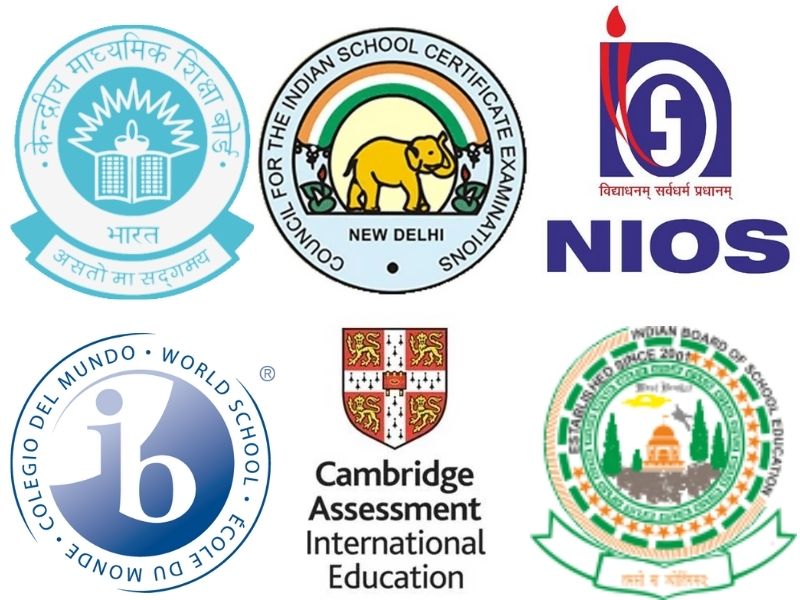-Riya Ganguly
CBSE, ICSE, NIOS, CAIE, IB- what are the differences between these boards and how do you make the correct choice?
India has a vast education system with a wide range of schooling boards, each with its unique curriculum and evaluation patterns. There are three national boards in India- namely, the Central board of Secondary Education (CBSE), the Council for the Indian School Certificate Examinations (CISCE), and the National Institute of Open Schooling (NIOS). Besides these, India has a vast array of state boards as well as private education boards such as the Indian Board of School Education (IBOSE). International boards have also been integrated into the Indian education system- they include the Cambridge Assessment International Education (CAIE) and the International Baccalaureate (IB). Here is a detailed outlook of the various education boards in India- their types, differences and curricula:
Central board of Secondary Education (CBSE)
Curriculum: Schools affiliated with CBSE follow the NCERT curriculum. The primary school curriculum comprises vocabulary studies and social progress. Middle and senior school curricula include science, mathematics, English and supplementary languages in addition to arts, sports and other activities. Science, humanities and commerce streams are offered to senior school students.
Examination pattern: CBSE conducts Continuous Comprehensive Assessments (CCE) from classes VI through X, and follows the grading system of evaluation. CBSE conducts the final examinations for class X (All India Secondary School Examination) and class XII (All India Senior School Certificate Examination) every year in March. The CBSE board is often favoured by applicants of medical and engineering examinations because the NCERT books form the basis of all entrance examinations conducted in India and because CBSE conducts the AIPMT (All India Pre Medical Test) and used to conducted the AIEEE examination (later merged with the IIT-JEE in 2013, now conducted by NTA).
Council for the Indian School Certificate Examinations (CISCE)
Curriculum: CISCE offers a prescribed syllabus and reading list to its students. The CISCE curriculum focuses on imparting practical/application-based knowledge and analytical thinking to students. Science, humanities and commerce streams are offered to senior school students. Students are offered a large range of subject options which they may choose from.
Examination pattern: Examinations are conducted for junior and middle school classes. The CISCE conducts the Indian Certificate of Secondary Education Examination for class X, the Indian School Certificate Examination and the Certificate for vocational education (CVE) for Class XII.
National Institute of Open Schooling (NIOS)
Curriculum: The NIOS board features the open basic education programme (OBE) for primary school students of classes III to VIII (divided into three levels). The class X course is called the secondary course in which the curriculum is drawn from two basic classes- a minimum of five subjects and one language. The senior secondary course (class XII) provides students with greater opportunities in science, humanities and commerce, split into five classes from which students have to select one or two per class. In addition, NIOS also provides vocational education courses, life enrichment programmes and D.EL.ED. courses.
Examination pattern: The NIOS board conducts OBE exams for primary school students. It administers secondary and senior secondary examinations similar to the CBSE and the CISCE exam patterns.
Cambridge Assessment International Education (CAIE)
Curriculum: The CAIE curriculum comprises primary, lower secondary and upper secondary to advanced levels which form the Cambridge Pathway. It offers a prescribed syllabus and recommended textbooks and reading lists. It is one of the most flexible education boards in India, offering more than 70 subjects alternatives at IGCSE level and over 55 subjects AS & A level. The curriculum stresses on English language and creative expression of students. Students aiming to apply to foreign universities often opt for this curriculum.
Examination pattern: The CAIE board conducts the International General Certificate of Secondary Education (IGCSE) (or O-level) exams for Cambridge upper secondary students, and the AS and A level exams for the Cambridge Advanced students in June, November or March.
International Baccalaureate (IB)
Curriculum: The IB board offers the following educational programmes: the IB Primary Years Programme (PYP) for children aged three to 12, the IB Middle Years Programme (MYP) for students aged 11 to 16 and the IB Diploma Programme (DP) and IB Career-related Programme for students aged 15 to 19. The integrated curriculum imparts experiment-based education and offers greater flexibility to students by not fixing any reading lists or textbooks. Students aiming to apply to foreign universities often opt for this curriculum.
Examination pattern: Exams are conducted for IB PYP, MYP as well as DP following the point system (points ranging from 1-7). The board conducts external assessments comprising essays, short-response questions, case studies and structured problems, as well as internal assessments including oral work, fieldwork, artistic evaluations and laboratory work. A student appearing for the full IB Diploma programme will have to appear for six IB exams.
Also read: Success Mantra of the world’s most admired school exams board
State Boards
Curriculum: The state board curricula, syllabi and prescribed textbooks are determined by the respective state governments, focusing on the particular state’s language, history and culture within the curriculum. Certain state boards prescribe NCERT books to aid students to prepare for various all-Indian examinations.
Examination pattern: The examination pattern varies state to state. Exams are conducted in all classes, and each state board conducts the Secondary School Certificate (SSC) examinations for class X students and the Higher Secondary School Certificate (HSC) examinations for class XII students.
Private education board- The Indian Board of School Education (IBOSE)
Curriculum: The IBOSE curriculum prescribes the syllabi, courses of instructions and text books for private school education all over India. Humanities, commerce and science streams are offered to senior secondary students.
Examination pattern: IBOSE conducts examinations for the secondary and senior secondary courses for which thousands of candidates appear annually. The public examinations are held every year from March to April on dates fixed by the IBOSE.
